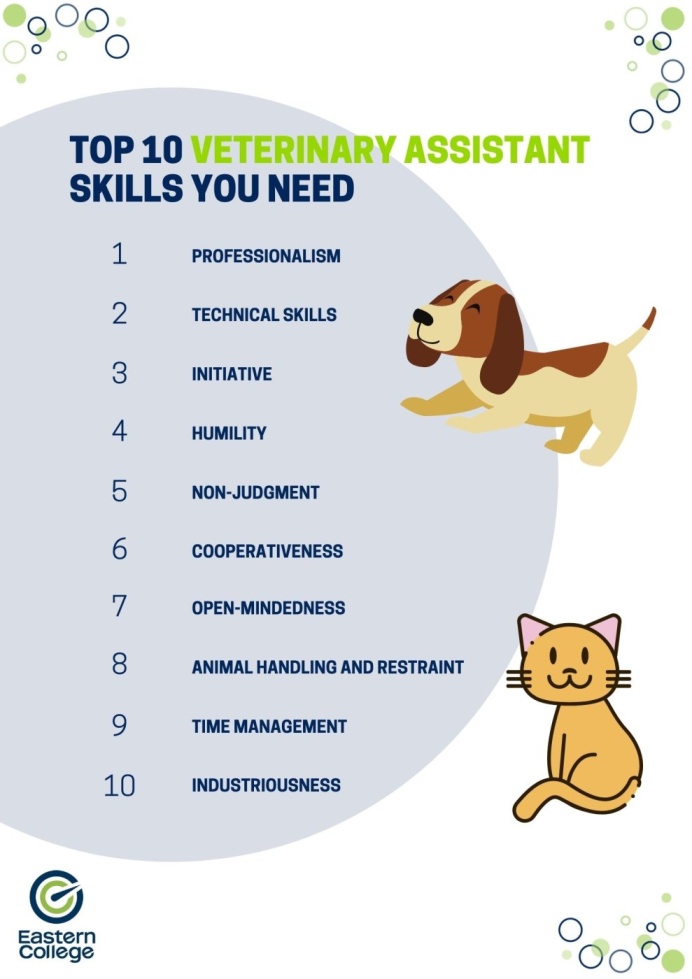Top 10 Veterinary Assistant Skills You Need
December 20th, 2021
If the sight of wagging tails or the sound of playful barking tugs at your heartstrings, then you know you love animals. And what better way to live and breathe your affection for animals than to work in the veterinary field?

Veterinary Assistants play a vital role in pet healthcare.
The fastest and easiest way to enter the veterinary field is to become a veterinary assistant. However, your fondness of your furry friends is not enough to make your veterinary career successful. You also need to know how to properly deal with clients or be flexible enough to work beyond normal business hours, for instance.
We have prepared a handy Veterinary Assistant Skills List for you to prepare yourself for an exciting and fulfilling job working with animals.
Veterinary Assistant Skills List
Skill # 1: Professionalism
Clients of veterinary clinics or hospitals rely largely on the staff to take care of their “family member.” They need to be assured that they and their pet will be treated with sensitivity, importance, and integrity.

Do you have the skills to become a successful veterinary assistant?
As a veterinary office assistant, you will act as the client-facing member of the veterinary team. Hence, you must ensure a seamless client experience, regardless of what is happening behind the scenes.
“Clients will judge a clinic based on the way they are treated by people at the front desk, the phone operators, and the people who will first bring them into the consultation room and get everything set up,” said Amber Alborg, Veterinary Assistant Instructor at Eastern College.
Even the way their animals are handled by a holder matters to clients, added Alborg.
Such tasks should then be executed professionally by vet assistants, who also deal with difficult topics such as grief, guilt, bad news, and difficult decisions.
Skill # 2: Technical Skills
You must be confident in helping with the preparation or use of surgical tools or diagnostic lab equipment. Other times, you may have to perform minor clinical tasks such as preparing animals for surgery, drawing blood that will be sent to the laboratory, or examining stool samples. Because you will carry out administrative tasks, you also need to know how to use the software used for scheduling appointments and managing client records.
Skill # 3: Initiative
Great veterinary assistants do not wait to be told what to do. There will always be things that can be done.
A veterinary team member who does the bare minimum or waits to be instructed is not carrying their weight. “The best assistants I have worked with are the ones who paid attention to what I said to clients, prepared materials or documents before I even asked, or prepared everything ahead of a procedure,” Alborg explained. “I have worked with both types of people, and both stood out strongly in my memory for very different reasons.”
“The best assistants I have worked with are the ones who paid attention to what I said to clients, prepared materials or documents before I even asked, or prepared everything ahead of a procedure.” – Amber Alborg, Veterinary Assistant Instructor at Eastern College
Skill # 4: Humility
It is normal not to know everything. Alborg recommended staying humble about not knowing all the facts.
Instead of making assumptions or pretending you know, it is better to clarify something you do not understand so you can make better decisions or give better advice. If you do not understand why a medical decision was made, ask.
Skill # 5: Non-Judgment
Do not judge a client’s personal or financial situation. Practice empathy and support clients on their decisions. Each person is different, so you cannot have a cookie-cutter approach for all of your customers.
“High-emotion situations demand empathy and understanding,” Alborg clarified. “Even small, passing comments that are overheard can greatly damage a client’s relationship with the clinic or their trust in the veterinary team.”
Skill # 6: Cooperativeness
“Vet assistants typically work under the direction of a veterinary technician and ultimately a veterinary doctor, so being a supportive and communicative team player is essential,” said Patti Green, Veterinary Administrative Assistant Instructor at Eastern College.
A veterinary assistant must uphold any decision a colleague makes, added Alborg. Trust the veterinarians and back them up when clients become upset or angry.
Skill # 7: Open-Mindedness
As new information gets discovered through time, veterinary practices may evolve. Treatment solutions may be replaced with a better alternative.
“This is the type of field where the learning is never really done as you can’t know everything about every animal,” Green said. “Being ready and willing to learn as much as possible will certainly help students reach success in this field.”
Alborg advised to continuously build on your knowledge base, so you can have a basic understanding of anatomy and physiology and the logic behind the medical procedures that are happening around you. A lot of YouTube channels can teach healthcare topics in fun and interesting ways.
Skill # 8: Animal Handling and Restraint
“Having a strong knowledge of animal behaviour and reading the body language of animals will allow veterinary assistants to use appropriate restraint methods or tools,” Green expounded. This then allows safe pet handling and enables a positive pet experience.
“Practice animal handling on different sizes and species as much as possible,” Alborg also recommended.
“Having a strong knowledge of animal behaviour and reading the body language of animals will allow veterinary assistants to use appropriate restraint methods or tools.” – Patti Green, Veterinary Administrative Assistant Instructor at Eastern College
Skill # 9: Time Management
A veterinary office assistant juggles a lot of tasks to guarantee smoothly-running operations. These may include answering phone calls, booking appointments, preparing the examination room, and organizing documents. A vet assistant should know which tasks require immediate attention and should then be prioritized.
Skill # 10: Industriousness
Working at a veterinary clinic means having to go the extra mile sometimes. This may involve working during lunchtime or after closing time due to a surgery or treatment administration, for instance. According to Alborg, a good team member should be willing to help with these tough situations without complaint.
How Much Do Veterinary Assistants Make?
According to Job Bank, the median hourly wage of a veterinary office assistant in Canada is $15.50 and can go as high as $26.00. In the Atlantic Region, the salary range can vary as follows:

How to Be a Veterinary Assistant
Working as a veterinary office assistant can be both demanding and gratifying. So how do you become a veterinary assistant? Volunteer as much as you can to expose yourself to veterinary clinic or hospital operations and meet a lot of people in the field to help you with your career. Peruse veterinary care assistant job descriptions, so you will know which areas you need to be competent in.
Most importantly, arm yourself with proper education to fortify your technical knowledge and cultivate your skills. Eastern College offers a 53-week Veterinary Assistant program and a 41-week Veterinary Administrative Assistant program. Both programs include an internship that can help you gain valuable, real-world experience and will earn you a diploma to increase your marketability when you start job hunting.
